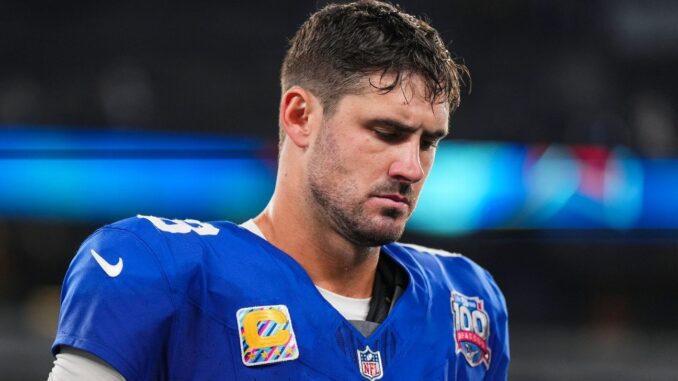
The New York Giants’ decision to bench quarterback Daniel Jones has sent ripples through the NFL. Once considered a cornerstone of the franchise, Jones is now sidelined, a move that reflects the team’s dissatisfaction with his performance. While this decision is undoubtedly a turning point for Jones, its implications stretch far beyond the quarterback position, impacting players, coaches, and the organization as a whole. Here’s a closer look at the five winners and five losers from this bold move.
Winners
- Backup Quarterback (e.g., Tommy DeVito or Replacement Starter)
The most immediate beneficiary of Jones’ benching is his replacement. This is a rare opportunity for the backup quarterback to shine on a big stage. If the new starter can perform well, they not only secure their role but may also energize a struggling offense. With the Giants’ issues well-documented, this change is a fresh chance for improvement. - The Defense
The Giants’ defense has faced immense pressure this season, often dealing with poor field position caused by turnovers or failed drives. A new quarterback who can manage the game better might provide the defense with much-needed breathing room. If the offense improves, the defense will likely benefit from shorter stints on the field, potentially enhancing their overall performance. - Skill Players
Players like Saquon Barkley, Darren Waller, and the Giants’ wide receivers could see an upswing in productivity. Jones’ inconsistency has limited their ability to make plays, with inaccurate throws and hesitation stifling the offense. A new quarterback who delivers the ball on time and within rhythm could unlock their full potential, increasing both their stats and morale. - Head Coach Brian Daboll
Daboll stands to benefit from this decision as it demonstrates his willingness to make tough calls for the betterment of the team. As a coach under scrutiny for the Giants’ lackluster season, this move could signal a reset for the offense. If the switch leads to improved performance, Daboll will be credited for his decisiveness and adaptability. - The Front Office
For General Manager Joe Schoen and the front office, the benching of Jones provides clarity. After investing in Jones with a significant contract extension, this move signals their willingness to pivot if he isn’t the long-term solution. It sets the stage for reevaluating the quarterback position, whether through the draft, free agency, or trade, giving them the freedom to chart a new path.
Losers
- Daniel Jones
The most obvious loser in this scenario is Daniel Jones himself. The benching is a public acknowledgment that he has failed to meet expectations, casting doubt on his future with the franchise. Once heralded as a potential franchise quarterback, Jones now faces the prospect of rebuilding his career, either in New York or elsewhere. - The Offensive Line
While Jones has shouldered much of the blame for the offense’s struggles, the offensive line has been a significant factor. Their inability to protect the quarterback has led to sacks, hurried throws, and turnovers. The benching of Jones shifts more attention to the line’s deficiencies, exposing their role in the team’s struggles. - Locker Room Chemistry
A midseason quarterback change can disrupt team dynamics, particularly if players have differing opinions about the decision. While some may see it as necessary, others might feel it’s unfair to Jones. This divide could affect morale and unity, especially if the replacement doesn’t immediately deliver results. - Joe Schoen (General Manager)
Although the benching gives the front office clarity, it also shines a spotlight on Schoen’s decision to commit to Jones with a lucrative contract in the offseason. If the team’s struggles continue or Jones fails to redeem himself, Schoen will face criticism for his evaluation and financial gamble. - Daniel Jones Supporters
Fans and analysts who believed in Jones as the franchise quarterback are left grappling with this setback. The benching challenges the narrative that Jones’ struggles were solely due to external factors like poor offensive line play or a lack of receiving talent, forcing his supporters to reassess his potential.
What’s Next for the Giants?
The benching of Daniel Jones represents a pivotal moment for the New York Giants. It’s a signal that the organization is prioritizing results over loyalty, and it could be the first step in a broader rebuild. For Jones, this decision forces him to reflect on his performance and work to improve, whether it’s in New York or elsewhere.
For the team, this move brings both opportunities and challenges. A new quarterback could reinvigorate the offense and spark a turnaround. However, if the change doesn’t yield immediate results, the organization will face further scrutiny.
Ultimately, the Giants’ decision to bench Daniel Jones highlights the urgency to fix their struggling offense and positions the team for a critical evaluation of its future direction. Whether it marks the beginning of a new era or another chapter in the Giants’ struggles remains to be seen.
Leave a Reply